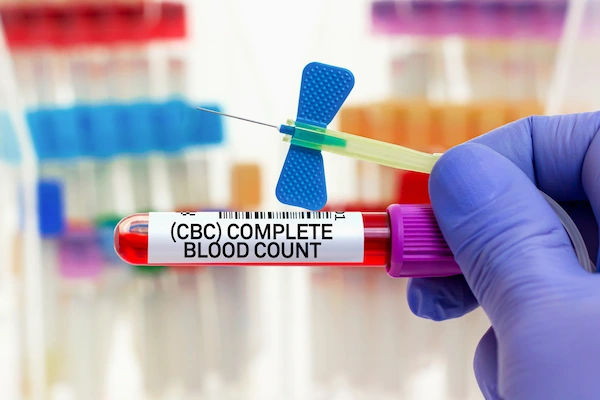Everyday Symptoms Women Shouldn't Ignore: What Your Blood Tests Reveal
Feeling tired, experiencing mood swings, or dealing with irregular periods? Learn what these symptoms could mean for your health and which blood tests every woman should consider.

Written by Dr. Shaik Abdul Kalam
Reviewed by Dr. Rohinipriyanka Pondugula MBBS
Last updated on 10th Sep, 2025

In the daily hustle, it's easy to dismiss persistent fatigue, subtle mood swings, or irregular menstrual cycles as normal parts of a busy life. We often attribute discomfort to stress or lack of sleep without considering that our bodies might be sending a more important message. Ignoring these early symptoms in women can be a mistake. Proactively investigating them is a critical step in self-care. A routine women health checkup offers a clear, informed look into your internal health, revealing potential issues that often go unnoticed.
This article explores common symptoms, what they could signify, and which blood tests can help you and your doctor uncover the answers you need.
1. Fatigue and Low Energy
Waking up tired, feeling drained by midday, and lacking the energy to do the things you love, this is a reality for countless women. While stress and lack of sleep are often blamed, these feelings can also be a red flag for a number of manageable conditions.
Potential Causes:
- Anaemia: This happens when your blood lacks enough healthy red blood cells to carry oxygen throughout your body. Without enough oxygen, your cells can’t produce the energy you need, leaving you feeling weak and exhausted.
- Thyroid Dysfunction: Think of your thyroid as the body’s thermostat. When it’s underactive (a condition called hypothyroidism), it slows down your body’s metabolism, which can lead to profound fatigue.
- Vitamin Deficiencies: Key vitamins, particularly Vitamin B12 and Vitamin D, are crucial for energy production and mood regulation. A deficiency can lead to a significant drop in your energy levels.
What Your Blood Tests Can Reveal:
Complete Blood Count (CBC): This is a routine check of your blood that looks at your red blood cells. Low levels of haemoglobin or hematocrit can be a clear sign of anaemia.
Book a CBC Test
Thyroid Profile: The main test here is for a hormone called TSH. High TSH levels can signal that your thyroid is underactive, while low levels can mean it’s overactive.
Vitamin B12 and D Tests: These tests measure the levels of these essential nutrients in your blood. The results can help your doctor determine if a simple supplement is all you need to get your energy back.
Schedule an Assessment and Get Your Health Checked
2. Irregular Periods
An irregular menstrual cycle, whether it's shorter, longer, or heavier than usual, is often a key indicator of hormonal fluctuations. Many women brush this off as normal, but it’s a symptom that can point to underlying conditions affecting fertility and overall health.
Potential Causes:
- Polycystic Ovary Syndrome (PCOS): This common hormonal disorder can cause irregular periods due to high levels of male hormones (androgens).
- Low Ovarian Reserve: A low count of remaining eggs can impact your hormonal balance and affect the regularity of your menstrual cycle.
- Thyroid Issues: Your thyroid gland plays a vital role in regulating your menstrual cycle, and an imbalance can often be the root cause of irregular periods.
What Your Blood Tests Can Reveal:
- AMH (Anti-Müllerian Hormone): This test gives an indication of your ovarian reserve, providing a sense of your egg count.
- FSH (Follicle-Stimulating Hormone) and LH (Luteinizing Hormone): These two hormones are crucial for ovulation. Checking their levels can give your doctor clues about PCOS, low ovarian reserve, or other issues.
- Prolactin: High levels of this hormone can disrupt your menstrual cycle. It is often checked when irregular periods are a concern.
- TSH (Thyroid Stimulating Hormone): Checking your TSH levels is a standard practice, as a thyroid imbalance is a common cause of menstrual irregularities.
3. Unexplained Hair Thinning or Skin Changes
Changes to your hair and skin can often be the first visible signs of an internal imbalance. While these can be linked to stress or dry weather, persistent issues like hair loss, a rash, or unexplained dryness can be a signal from your body that something is amiss.
Potential Causes:
- Iron Deficiency: Iron is essential for the growth of healthy hair. A lack of iron can lead to hair shedding and thinning.
- Hormone Imbalance: Hormonal changes, particularly in your thyroid hormones, can cause hair loss and affect your skin’s texture.
- Autoimmune Activity: Conditions where your immune system mistakenly attacks your own body, such as Lupus, can show up as hair thinning and specific skin changes.
What Your Blood Tests Can Reveal:
- Ferritin: This blood test measures your body’s iron stores. Low ferritin levels are a key indicator of an iron deficiency.
- Thyroid Profile: As mentioned before, TSH and other thyroid hormones are essential for cell growth, including hair follicles. A thyroid imbalance can cause noticeable changes in your hair and skin.
- ANA (Antinuclear Antibodies): This test checks for antibodies that can indicate an autoimmune condition. An elevated ANA can be a starting point for further investigation if other symptoms are present.
4. Mood Changes and Anxiety
If you feel more anxious, irritable, or emotionally volatile than usual, it’s easy to assume it’s just a side effect of a busy life. However, these mood changes can often be directly linked to your hormones and nutrient levels.
Potential Causes:
- Vitamin D Deficiency: There is a strong link between low vitamin D levels and an increased risk of depression and anxiety.
- Thyroid Imbalance: An overactive thyroid (hyperthyroidism) can cause anxiety and irritability, while an underactive one can lead to feelings of depression and lethargy.
- Hormonal Fluctuations: Hormones like FSH and LH are not just for your reproductive system; they also influence your mood and brain function.
What Your Blood Tests Can Reveal:
- Vitamin D Test: A simple blood draw can determine if you have a deficiency, which can then be corrected with supplementation.
- Thyroid Profile: Abnormal thyroid hormone levels are a common and easily identifiable cause of mood swings and anxiety.
- FSH and LH Tests: While often associated with fertility, these tests can also help pinpoint hormonal imbalances that may be contributing to significant mood changes.
5. Unexplained Weight Gain or Loss
Unexplained changes in weight can be frustrating and alarming. When your diet and exercise habits haven’t changed, a sudden shift on the scale is often a sign that your metabolism isn’t functioning optimally.
Potential Causes:
- Insulin Resistance: This occurs when your body’s cells don’t respond effectively to insulin, the hormone that regulates blood sugar. As a result, your body may store more fat, leading to unexplained weight gain.
- Slow Thyroid Function: An underactive thyroid (hypothyroidism) slows down your metabolism, making it difficult to lose weight and easy to gain it
- Hormonal Changes: Fluctuating hormones can affect your metabolism and appetite, contributing to weight changes.
What Your Blood Tests Can Reveal:
- Fasting Insulin: This test measures your insulin levels after fasting. High levels can be a key indicator of insulin resistance, even before blood sugar levels become a concern.
- HbA1c: This test provides an average of your blood sugar levels over the past 2-3 months. It’s an excellent tool for screening for insulin resistance and prediabetes.
- TSH (Thyroid Stimulating Hormone): High TSH levels can confirm hypothyroidism, which is a common cause of unexplained weight gain in women.
Conclusion
Early symptoms in women, like fatigue, mood changes, or bloating, may point to underlying health conditions. These signs are your body's way of signalling the need for attention and care.
Regular women health checkup appointments give you a better understanding of what is happening inside your body. With the help of accurate blood tests, you and your doctor can detect problems early and take informed steps toward better health.
Schedule an Assessment and Get Your Health Checked
₹398(₹995)60% off
₹670(₹1675)60% off
₹1451(₹3375)57% off
₹2043(₹4750)57% off
₹670(₹1675)60% off
₹670(₹1675)60% off
₹619(₹1547)60% off
₹2300(₹5750)60% off
₹670(₹1675)60% off
₹1250(₹3125)60% off





.webp)

